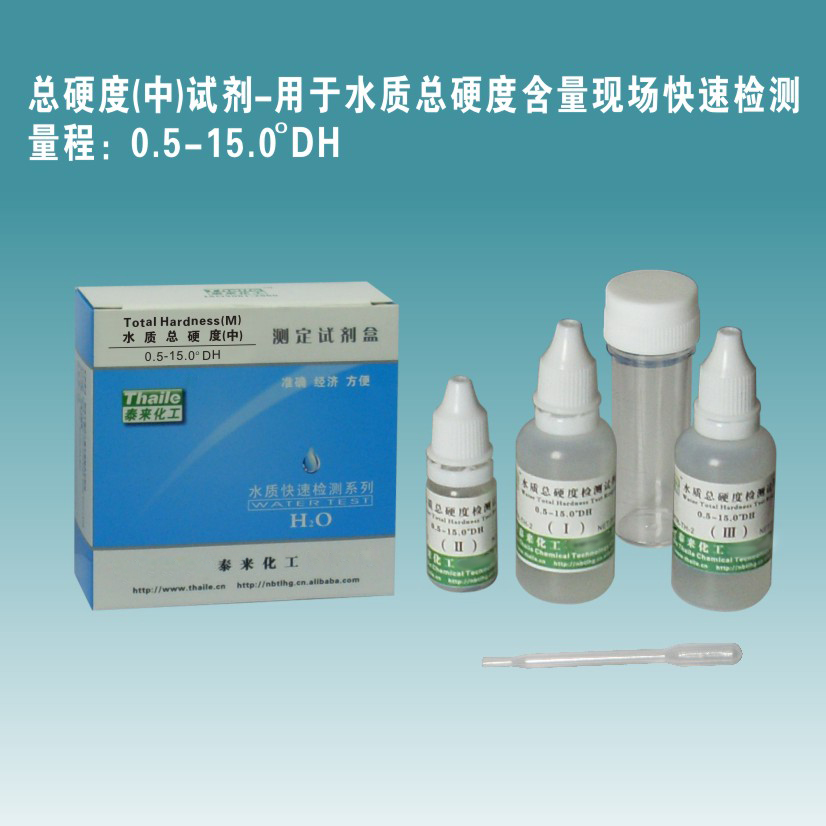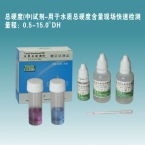Products & Services



Background:Total water hardness is mainly composed of salts of Calcium and Magnesium ions, which includes temporary hardness and permanent hardness and is an important index to assess the water quality. In many water application industries, the water hardness should be controlled well.As the traditional test method for total hardness is complicated, the R&D team of Thaile Chemical has successfully developed “Thaile” Total Hardness test kit for quick on-spot testing.The new test kit can greatly simplify the operation and significantly lower the testing cost with reliable testing result.
Principle: Determine the total hardness of tested water based on titration method.
Purpose: Rapid quantitative test for total hardness. On-spot quick test in various water consumption field, including industry, agriculture, aquiculture, healthcare, environment and domestic.
Features:
1.Fast and easy: Users don’t need special training, can complete a total hardness test for water sample within 5 minutes according to the directions for use.
2.Accurate and reliable: The results of determination are the same as national standard, it can be an alternative method for national standard.
3.Cheap price: The cost is very cheap.
4.Convenient to carry: It is of small size, light weight and is suitable for on-site rapid testing.
Operation:
1.Use the test water sample to rinse colorimetric tube twice, then measure out the test water sample and adjust the sample volume to 10 ml graduation line of colorimetric tube by plastic burette.
2.Drip 10 drops of ReagentⅠinto colorimetric tube and shake well.
3.Spray some little ReagentⅡinto colorimetric tube gradually, and shake the tube until the powders are dissolved completely, then the color of test water sample shall be changed to wine red. (If the color is changed to blue, it indicates that the hardness of test water sample is lower than the detection lower limit of this method 0.477°DH)
4.And then, drip Reagent Ⅲ into colorimetric tube, shake the colorimetric tube several times when drip every drop, and continue dripping until the color of test water sample is changed from wine red to purple, and to blue finally. Record the number of dripped drops of Reagent Ⅲ.
5.Calculate the total hardness of test water sample: Total hardness(°DH)=0.477×drop number of Reagent Ⅲ. (This method introduces German hardness °DH formulation, i.e. 10 mg calcium oxide contained in 1 L water=1 German hardness °DH)
Notes:
1.If the water is turbid, take the supernatant after clarification by filtering or resting, and then conduct the test according to the above method.
2.Try to compare the colors in bright light.
3.The plastic burette is only used to adjust the volume of test water sample, rather than to take the reagent by dripping. The above-mentioned drop number of Reagent Ⅲ is the drop number extruded from the reagent bottle.
4.The PH value of test water sample shall be controlled within the limit of 6-8, if it is not within this scope, please retest after adjusting well by dilute NaOH or Hcl.
5.The dosage of ReagentⅡis appropriate when the water sample appears the color of neither too dark nor too light wine read; otherwise it isn’t conductive to observe color conversion at the titration endpoint. But the dosage of ReagentⅡhas no effect on test results.
6. In case of skin or eye contact of the reagent, just wash it away with water.ReagentⅠis slightly pungent, please avoid inhalation as possible during use.
7.After use, please tighten the cap to avoid ineffectiveness.
Liability: The manufacturer and its authorized agents are free from any liabilities due to accidental intake of children and misunderstanding or misuse of the users. If the results of test are dubious, please present the sample to authoritative laboratory for further test.
Appearance: Reagent Ⅰ: colorless liquid Reagent Ⅱ: gray powder Reagent Ⅲ: colorless liquid
Specifications: Reagent Ⅰ: 25 ml Reagent Ⅱ: 2.5 g Reagent Ⅲ: 25 ml (50 times per kit)
Including: Reagent Ⅰ, Ⅱ, Ⅲ: 1 pc respectively, Colorimetric Tube: 1 pc, Plastic Burette: 1 pc, Users’ Manual: 1 pc.
Package :LDPE Bottle, Carton
Standard: QB-TCS-WTR-2011
Validity: 1 year
Store: Store in a cool and shady place out of reach of children.
Manufacturer: Ningbo Thaile Chemical Technology Co., Ltd
Website: http://www.thaile.cn http://nbtlhg.1688.com
Appendix:
Hardness Conversion Table
|
Hardness unit |
German |
Britain |
France |
America |
mmol/L CaCO3 |
mg/litre equivalent |
mg/L (ppm) CaO |
|
|
°DH |
°Clark |
°FH |
mg/L (ppm) CaCO3 |
|||||
|
German |
1°DH |
1 |
1.2493 |
1.7848 |
17.8478 |
0.1783 |
0.3566 |
10 |
|
Britain |
1°Clark |
0.8004 |
1 |
1.4286 |
14.2857 |
0.1427 |
0.2855 |
8.0042 |
|
France |
1°FH |
0.5603 |
0.7 |
1 |
10 |
0.0999 |
0.1998 |
5.6030 |
|
America |
1mg/L (ppm) CaCO3 |
0.0560 |
0.07 |
0.1 |
1 |
0.0100 |
0.0200 |
0.5603 |
|
1mmo1/L CaCO3 |
5.608 |
7.063 |
10.009 |
100.09 |
1 |
2 |
56.08 |
|
|
1 mg/litre equivalent |
2.804 |
3.5315 |
5.0045 |
50.045 |
0.5 |
1 |
28.04 |
|
|
1mg/L(ppm) CaO |
0.1 |
0.1249 |
0.1785 |
1.7848 |
0.01783 |
0.03566 |
1 |
|
Previous:Total Hardness Test Kit (low)